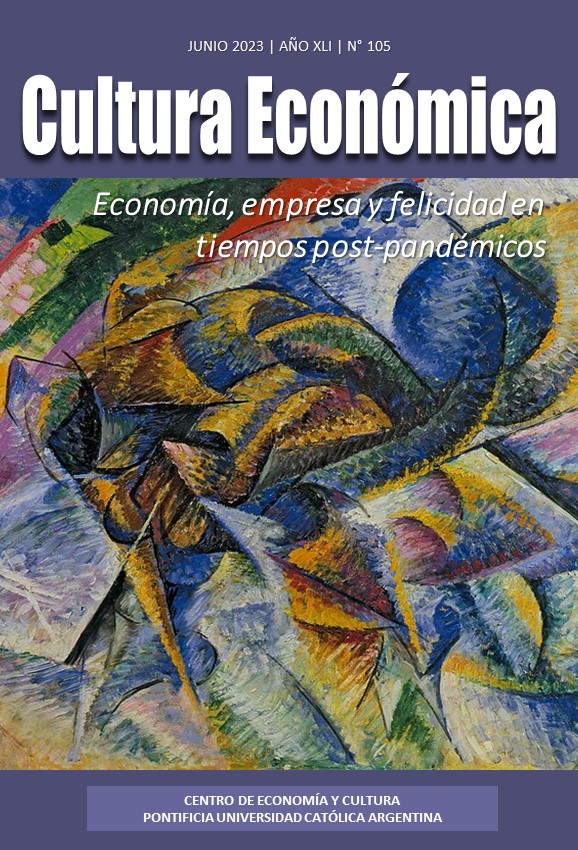The Wellbeing Analogy
DOI:
https://doi.org/10.46553/cecon.41.105.2023.p11-21Palabras clave:
well-being, analogy, Aristotle, eudaimoniaResumen
The diversity of meanings or applications of “wellbeing” fuel a discussion about its context-dependence or not. This article will first introduce this discussion. Next, it will present the classical logical notion of analogy considering it as a possible answer to the discussion. After that, Section 3 will apply analogy to wellbeing and will suggest its possible “primary meaning”. Finally, a short conclusion will follow.Descargas
Citas
Ackrill, J. L. (1980). Aristotle on eudaimonia. In A. O. Rorty (Ed.), Essays on Aristotle’s Ethics (pp. 7-14). University of California Press.
Alexandrova, A. (2016). The Science of Well-Being. In G. Fletcher (Ed.), The Routledge Handbook of Philosophy of Well-Being (pp. 389-401). Routledge.
Alexandrova, A. (2017). A Philosophy for the Science of Well-Being. Oxford University Press.
Arabi, S. H. (2016). Well-being orthodox theories and Islamic views. International Journal of Social Economics, 43(2), 190-204. https://doi.org/10.1108/IJSE-01-2013-0019.
Aristotle (1938). Categories (Trad. H. P. Cooke & H. Tredennick). Harvard University Press.
Aristotle (1941). The basic works of Aristotle (Edited and with an introduction by Richard McKeon). Random House (reprint of the translations prepared under the editorship of W. D. Ross. Oxford University Press).
Ashworth, E. J. (2017). Medieval Theories of Analogy. In E. N. Zalta (Ed.), The Stanford Encyclopedia of Philosophy (Fall 2017 Edition). Stanford University. https://plato.stanford.edu/archives/fall2017/entries/analogy-medieval/
Besser-Jones, L. (2016). Eudaimonisn. In G, Fletcher (Ed.), The Routledge Handbook of Philosophy of Well-Being (pp. 187-196). Routledge.
Bradford, G. (2016). Perfectionism. In G. Fletcher (Ed.), The Routledge Handbook of Philosophy of Well-Being (pp. 124-134). Routledge.
Campbell, S. (2016). The Concept of Well-Being. In G. Fletcher (Ed.), The Routledge Handbook of Philosophy of Well-Being (pp. 402-413). Routledge.
Crisp, R. (2021). Well-Being. In E. N. Zalta (Ed.), The Stanford Encyclopedia of Philosophy (Fall 2021 Edition). Stanford University. https://plato.stanford.edu/archives/fall2021/entries/well-being/
Fletcher, G. (2009). Rejecting Well-Being Invariabilism. Philosophical Papers, 38(1), 21-34.
Fletcher, G. (2013). A Fresh Start for the Objective-List Theory of Well-Being. Utilitas, 25(2), 206-220.
Fletcher, G. (2016). Objective List Theories. In G. Fletcher (Ed.), The Routledge Handbook of Philosophy of Well-Being (pp. 148-160). Routledge.
Fletcher, G. (2019). Against Contextualism About Prudential Discourse. The Philosophical Quarterly, 69(277), 699-720.
Kraut, R. (1989). Aristotle on the human good. Princeton University Press.
Kraut, R. (2007). What is Good and Why. Harvard University Press.
McInerny, R. (1961). The Logic of Analogy. Martinus Nijhoff.
Mitchell, P., & Alexandrova, A. (2021). Well-being and Pluralism. Journal of Happiness Studies, 22, 2411-2433.
Descargas
Publicado
Cómo citar
Número
Sección
Licencia













